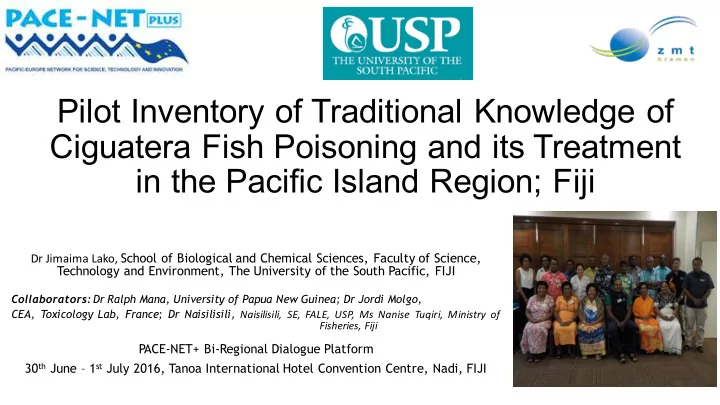

Pilot Inventory of Traditional Knowledge of Ciguatera Fish Poisoning and its Treatment in the Pacific Island Region; Fiji Dr Jimaima Lako, School of Biological and Chemical Sciences, Faculty of Science, Technology and Environment, The University of the South Pacific, FIJI Collaborators: Dr Ralph Mana, University of Papua New Guinea; Dr Jordi Molgo, CEA, Toxicology Lab, France; Dr Naisilisili, Naisilisili, SE, FALE, USP, Ms Nanise Tuqiri, Ministry of Fisheries, Fiji PACE-NET+ Bi-Regional Dialogue Platform 30 th June – 1 st July 2016, Tanoa International Hotel Convention Centre, Nadi, FIJI
Objectives: Pr Progressive Ou Outcomes: • To explore traditional • Species of ciguatoxicfish in Fiji knowledge related to the • 12 species - Moray eel ( gymnothorax) , Two Sport Red Snapper identification and ( tutjanus) , Long-face emperor ( lethrinus) , Rivulated snapper, Brown- quantification of the; Marbled Grouper ( plectropomus) , Pick Handle Barracuda ( sphyraena) , Leopard coral grouper, Gold spot herring, Mangrove red snapper, Black branded snapper, Russells’ snapper and LongSpot Snapper. • species of ciguatoxic • Sites and hotspots of occurrence fish • There are localized and seasonal fish poisoning which makes certain species of fish poisoned in some iqoliqoli sites and not others and seasonality is • ciguatoxic iqoliqoli associated with Balolo season. (reef sites) hot spots • Two major hotspots; Senimuna in Kadavu, Kabara reef in Lau, where all fish are apparently poisonous throughout the year. • seasonality of • Seasonality of ciguatoxin ciguatoxin • Seasonality of ciguatoxin appears to be associated with the * Balolo occurrence season (Nereirs – edible sea worm); October and December. • Reporting mechanism • reporting mechanism • Unreported cases are prevalent and that very few visit the of ciguatera fish hospital/health centres poisoning • Traditional herbal treatment of ciguatoxin • More than six sets of effective traditional herbal medicine were • treatment of identified for the treatment of ciguatoxin. ciguatoxin • Some may be effective than others in the rate at which recovery from ciguatoxin occurred
Future Perspect ctives • USP SRT proposal entitled “Investigating ciguatera fish poisoning in Fiji water hotspots – traditional ecological knowledge and biological processes of occurrence and accumulation in seafood” has been granted small amount to initiate the scientific experiments and a springboard for other funding applications. • Aims at validating TEK by investigating ciguatera fish poisoning focusing on two hotspots; Senimuna and Kabara reefs by performed experiments under controlled conditions and on selected fish species to better understand the biological processes of occurrence and accumulation. • Collaborators – Masa-JICA; Nanise-Ministry of Fisheries; Dr Chinain – ILM -French Polynesia. • Development of a ciguatera regulatory framework in the catch, sale, consumption, reporting and monitoring of ciguatera fish poisoning cases. • The bio-discovery of active ingredients in the six sets of traditional herbal medicine identified and the establishment of their dose response in the development of future medicine/drug will need to be further investigated. • Networking: Prof. Dr Zimmermann – University Hospital Erlangen- Germany (CIGUA-CRIMSON); Dr Molgo – CEA, France. • A booklet based on “Traditional Knowledge” to indicate species of poisonous fish, poisonous site and traditional medicine in the treatment of ciguatera fish poisoning is to be developed and made available to communities and industries.
Recommend
More recommend